Showing 131–139 of 139 results

This book presents an understanding of God in various religions and traditions around the world Brahman in the Upanishads, Allah in Islam, God in Tibetan, Zoroastrian, Buddhist and Jaina faiths, the conception of the divine in Christianity and the folk deities of the Adivasi groups.
The result of a seminars proceedings, the volume presents an understanding of God in various religions and traditions around the world. It examines the concept of the Brahman in Hindu religious thought, and God as forming the relationship between the unmanifest Brahman and the manifest Universe. It views the approach of the Semitic religions that make absolute difference between God and Man. It discusses the glory associated with God, the nature of the Supreme God and His lesser denominations as well as the modern notion of God as a human creation and residing in the mind of Man. It delves into the core of the Upanishadic thought, God in Tibetan thought, signs of Allah and his attributes in Islam, God in the Zoroastrian faith, Buddhism and Jainism vis-a-vis the notion of divinity and the Christian conception of the divine. It deals with God in the Shamanic cosmogonies of some Adivasi groups of eastern India and the syncretic folk deities of Sundarbans in West Bengal. The scholars interpret the cosmological, teleological and ontological proofs, in various forms, to understand the reality of God.
The volume, with its painstaking studies, will prove invaluable to scholars and readers, mainly those associated with religious studies.
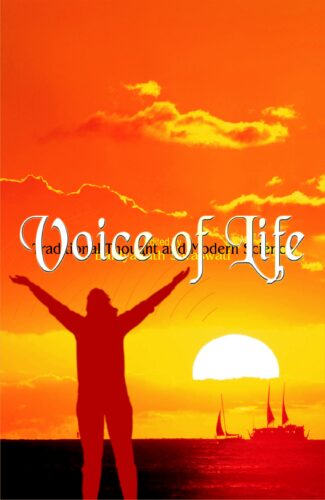
The book presents views on life from the traditional as well as modern perspectives to come up with many interpretations surveys evolution of life and extinction theories, focusing on development of life over 600 million years from simple to complex. The contributors delve into the Upanisadic and Vedic concepts of life, and the Hindu astrological and ayurvedic perception and Christian perspective of life as well.
The volume presents views on life from the traditional as well as modern perspectives to come up with many interpretations. Indologists, anthropologists, sociologists, philosophers and physical and social scientists profess that traditional thought and modern science offer two different world-views on life: the first encompassing a wholeness of life, and the other explaining the universe and life with ideas of the realm of matter alone. Referring to various ancient texts as well as thoughts of social scientists based on empirical studies, the contributors delve into the Upanishadic and Vedic concepts of life, and the Hindu astrological and ayurvedic perception of life. They examine the Christian perspective of life as well. Discussing the theme from the viewpoint of physical law, the book surveys evolution of life and extinction theories, focusing on development of life over 600 million years from simple to complex. It ponders over questions like radical difference between living and non-living matter though both consist of molecules. Connecting science to societal development, it deals with ancient community theories on life and nature taking specific ethnic communities like the Mesoamericans and the Santals in India as examples. The book is an all-inclusive and extensive study of traditional and scientific perspectives on the life origin, urges and responses, meaning and essence of life, and its development.
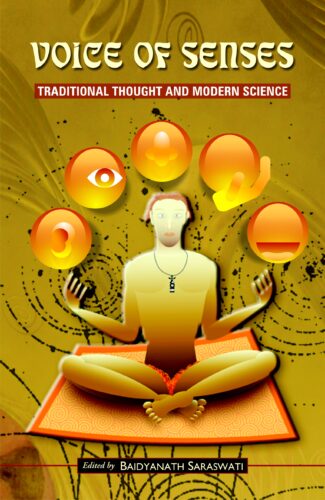
This volume is devoted to a thorough understanding of the concept of senses as interpreted in the ancient Asian traditions with particular reference to Indian religious and philosophical thought. It examines the functions, perception, scientific approach and the recurring cycle of Five Senses in Chinese, Tibetan and Indian philosophy.
This volume is devoted to a thorough understanding of the concept of senses as it has been interpreted in the ancient Asian traditions with particular reference to Indian religious and philosophical thought. It examines the functions of the sense-organs and the perception of them adopting a sociological and scientific approach. The first part of the presentation comments on the recurring cycle of Five Senses in Chinese, Tibetan and Indian philosophy. It takes up ancient knowledge on the senses as can be gained from the Vedas and the Upanishads, the Buddhist Abhidharma text and Jainism, as also from Islamic and Christian philosophies. They relate functioning of the sense-organs to aesthetic perception. Articles in the second part examine ethnic-cultural communities’ responses to senses and attribution of functions to them, as, for instance, the importance attached to the senses by the traditional snake-charmers. They study responses by plant and animal life to their environment and inquire into the biological processes involved in sense perceptions. Modern technology is discussed as imitating the Five Senses. These articles should be of benefit to scholars interested in learning about the different aspects of Indian religious and philosophical perceptions.
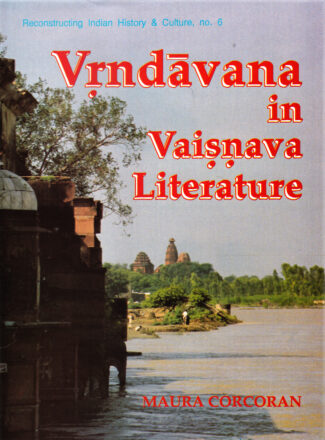
The book explores the essential nature of Vrndavana, analysing various Vaisnava texts mythological, meta-physical, devotional and commentatorial. It identifies a notional sequence of ideas connected with Vrndavana the description of a mythic place, a symbolic place, etc.
A well-known geographical site on the banks of the Yamuna, about 150 kilometers from Delhi, VRINDAVANA is the holiest of the pilgrimages for the worshippers of Krishna. However, in the devotional Sanskrit and Braj Bhasha literatures, another dimension of Vrindavana dominates the picture, i.e., its role as an expression of the divine realm. What, then, is Vrindavana? A terrestrial place of pilgrimage? A mythic locale associated with Krishna and Radha? Or a metaphysical concept symbolizing the celestial space of the eternally-going lila (divine sport)? With sharp focus on these and allied questions, Dr. Corcoran explores afresh the essential nature of Vrindavana, critically analysing the representative texts from the immense corpus of Vaishnava literature of different genres: mythological, metaphysical, devotional and commentatorial. The authors inquiry seeks to identify a notional sequence of ideas connected with Vrindavana: the description of (a) a mythic place, (b) a symbolic place, (c) the geographical town as a centre of pilgrimage. And also looks at other thematically relevant concepts, for instance, avatara (incarnation) and lila (divine sport), underlying the entire understanding of the nature of the divine and the relation of the divine to the material world. The book exhibits a striking departure from modern sources which have, for the most part, concentrated on Vrindavana as a geographical place, glossing over its symbolic and mythic significance.
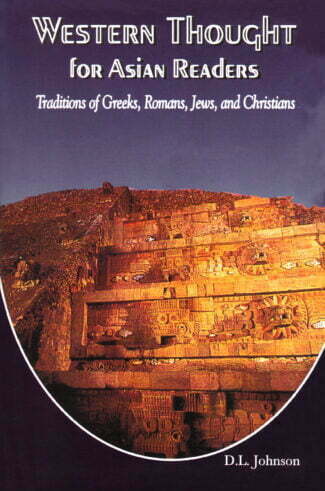
Writing in a simple language, Prof. D. L. Johnson acquaints Asian readers with the traditional ideas and values that have shaped the culture of the western world over centuries, mainly dominant thinkers and ideas of classical Greece and Rome and religious traditions of the Jews and the Christians.
This book acquaints Asian readers with traditional ideas and values that have shaped the culture of the Western world over centuries. Written in simple language, it throws light on dominant thinkers and ideas of classical Greece and Rome as well as the religious traditions of Jews and Christians. Greek mythology, Greek epic literature and drama are included in the survey. The impact of Greek philosophy in moulding of Western thought as well as the Roman interpretations of Greek philosophy are included. The history of Jewish and Christian interpretations of god and the human predicament are explained with clarity and compared and contrasted with Asian ideas. Special attention is given to controversial ideas which often confuse Asian readers, as for instance the Jewish and Christian assertion of their ideas as truth claims. The book will be useful to scholars of Asia as well as to general readers and students keen on understanding the sources of Western culture and its appeal today.
Lord Buddha, in his profound wisdom, said that for extinction of human suffering, complete annihilation of desire is the only way. This is the sacred truth of suffering.
Acarya Carvaka, equally profound in his thinking, said that life is a continuous celebration of desire. Kama (desire) and artha (wealth) are the only true goals of life. Beg, steal or borrow, but live life like a king. Enjoy life full as long as one is alive.
Who is correct? Lord Buddha or Acarya Carvaka? What is desire really meant to Indian society, religion and culture through ages?
The book tries to address these and similar questions objectively and diligently.
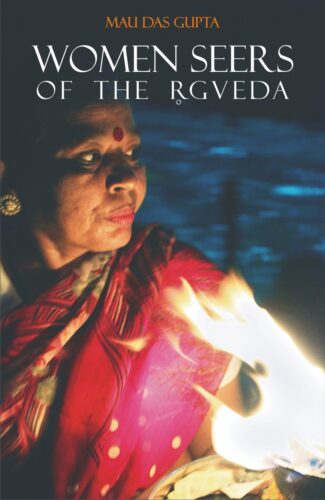
Providing detailed accounts of the women seers of Rigveda, this volume discusses the traditional expositions vis-à-vis the modern interpretations of those accounts. It minutely explains the sociocultural aspects of the select texts, thus exposing the world-view of those women seers.
This volume brings forth an in-depth study of Rigveda from the sociocultural perspective, analysing the various aspects of hymns ascribed to the women seers of the root Veda. Though modern scholars from the East and the West have made many an attempt in interpreting the hymns of the Rigvedic poetesses, those lacked a thorough study from the sociocultural perspective.
While providing detailed accounts of the women seers of Rigveda, this volume discusses the traditional expositions vis-à-vis the modern interpretations of those accounts. It minutely explains the sociocultural aspects of the select texts, thus exposing the world-view of those women seers. Their personal traits and compositions on the basis of the mythological data available in the Vedic and subsequent literatures enrich the volume further.
Apart from the liturgical peculiarities and literary analysis of the hymns of the women seers, and the language and stylistics of the texts from a linguistic point of view, the book deals with a study of the sentence patterns which, normally lacks in Sanskrit research works.

The image of Yama, the god of death in Hindu mythology, has come to have many variants. Dr. Merhs study tries to capture these against their essential literary settings to explore all possible traits of Yamas personality.
In the Hindu pantheon, Yama holds a unique place. A counterpart, in the indigenous tradition, of Avestan Yima, Egyptian Osiris or Greek Pluto, he inspires terror in the heart of an average mortal : not only owing to his overlordship of the abode of the dead, but also for his identification with death itself. Yamas image in Hindu mythology, however, has come to have full many variants which Dr. Merhs study tries to capture against their essential literary settings. Based on the prodigious mass of Indias old-world scriptural literature the Vedas, Samhitas, Brahmanas, Aranyakas and Upanishads, besides the puranic texts, the book meticulously explores all possible traits of Yamas personality, highlighting how the mythical view of this glorious, other-world god passes through a striking change over the millennia between the Rigveda and the later Puranas. Unfolding the deitys Vedic and Puranic descriptions respectively in part 1 and part 2 of the book, the author focusses specially on Yama, the creator, preacher, the philosopher, the law-giver, the punisher and above all, on his role as an eschatologist. Invaluable to the scholars of Indology, Hindu mythology and comparative religion.
इस पुस्तक में राष्ट्रवाद की पश्चिमी एवं भारतीय अवधारणा के अनुसार व्याख्या की गई है तथा दोनों में अन्तर्विरोधों एवं विशिष्टताओं को रेखांकित किया गया है। पश्चिम में परिप्रेक्ष्य रहित व्यक्ति की अवधारणा पर आधारित राष्ट्रवाद राजनीतिक राष्ट्रवाद के रूप में ही क्यों परिणत होता है और वह मानवतावाद के विरुद्ध क्यों प्रवृत्त है, यह इस पुस्तक का प्रथम प्रतिपाद्य विषय है। अद्वैत दर्शन पर आधारित सर्वात्मवादी राष्ट्रवाद मानवतावाद की ओर कैसे अग्रसर होता है यह पुस्तक का दूसरा प्रतिपाद्य विषय है। राष्ट्रवाद के प्रायः सभी प्रभावी विमर्शों की चर्चा के साथ-साथ यह पुस्तक भारतीय राष्ट्रवाद का एक अवधारणात्मक विमर्श प्रस्तुत करती हैए जिसे सर्वात्मवादी राष्ट्रवाद का नाम दिया गया है। इस पुस्तक में आधुनिकता को भारत विभाजन के मुख्य कारण के रूप में स्थापित किया गया है।
| There are no products |